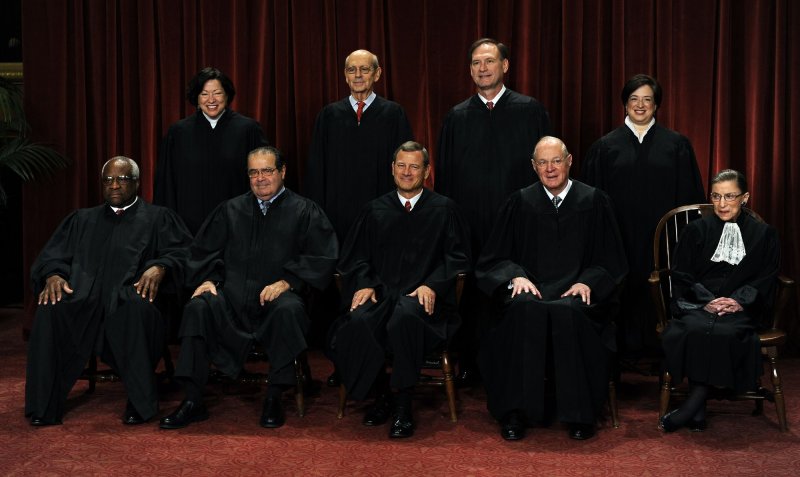The Supreme Court Justices of the United States sit for a formal group photo in the East Conference Room of the Supreme Court in Washington on October 8, 2010. The Justices are (front row from left) Clarence Thomas, Antonin Scalia, John G. Roberts (Chief Justice), Anthony Kennedy, Ruth Bader Ginsburg; (back row from left) Sonia Sotomayor, Stephen Breyer, Sameul Alito and Elena Kagan, the newest member of the Court. UPI/Roger L. Wollenberg |
License Photo
WASHINGTON, Jan. 24 (UPI) -- The U.S. Supreme Court said Monday it would decide whether inmates must be told their rights when taken from their cells for questioning about a separate crime.
The high court ruled in 1966's Miranda vs. Arizona that suspects in custody have to be advised they have the right to remain silent and the right to a lawyer before questioning. The issue for the current court is whether that ruling applies to prisoners questioned about a crime other than the one that landed them in prison or jail.
In the current case, Lenawee County, Mich., sheriff's deputies were investigating the possible sexual abuse of a minor, SCOTUSBLOG.com reported. Randall Fields was serving a 45-day sentence for disorderly conduct in the local jail.
Fields was taken from his cell and questioned for as long as seven hours in the sexual abuse investigation, the report said, though he was told he could leave a conference room, the site of the questioning, the report said.
State courts ruled Fields was in custody -- though he was told he could leave the conference room -- but because there was no connection between the disorderly conduct conviction and the sexual abuse investigation, officers were not obligated to advise him of his rights.
But when Fields took his argument to federal court, SCOTUSBLOG said, a federal appeals court ruled that a 1968 Supreme Court precedent meant a Miranda warning was necessary whenever "an incarcerated individual is isolated from the general prison population and interrogated, (that is) questioned in a manner likely to lead to self-incrimination about conduct occurring outside the prison."
The state then asked the Supreme Court to review what it called a "bright-line rule." Argument should be heard next term.















